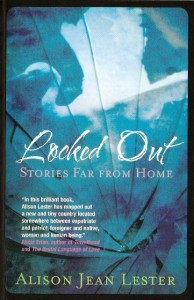 I’ve been living abroad for eight years now, so I totally understand what it means to be “far away from home.” Although I made Thailand my home, I will never forget that my real, my first home is, from a geographical point of view, 7,000 kilometers to the West. Alison Jean Lester, the author of Locked Out. Stories Far From Home, also a globetrotter, created in her collection of short stories a world in which the characters, more often than not, feel a sense of dislocation, feel that they are, as the title suggests, far away from home.
I’ve been living abroad for eight years now, so I totally understand what it means to be “far away from home.” Although I made Thailand my home, I will never forget that my real, my first home is, from a geographical point of view, 7,000 kilometers to the West. Alison Jean Lester, the author of Locked Out. Stories Far From Home, also a globetrotter, created in her collection of short stories a world in which the characters, more often than not, feel a sense of dislocation, feel that they are, as the title suggests, far away from home.
Alison Jean Lester has lived both in the West (United States, Italy, and United Kingdom) and the East (China, Taiwan, Japan and Singapore). Locked Out, her first book, published by Monsoon Books (Singapore, 2006), is made up of ten short stories set in different Asian countries. In 2008, she has also published at Marshall Cavendish two books of non-fiction: Present for Success: A powerful approach to building confidence, developing impact and transforming your presentations and Communication: Your Key to Success (with Shirley Taylor). A prolific writer, Alison is now a communication coach and frequent contributor to The Straits Times (Singapore).
Locked Out, the eponymous short story that opens the book, deals with the conflicts of two civilizations: Western and Far Eastern. An American woman struggles to keep up with the “competition,” her husband’s Japanese assistant, but at the same time, she tries to remain true to herself. In Bill’s Bones, Judith Reynolds returns to an Indonesian island, where her husband drowned after an argument the year before, in the hope of finding his bones: “She sat back on her haunches and looked out at the surf. Suddenly she knew that Bill’s bones wouldn’t rise again.” Instead of bones, she (re)discovers her freedom and joy of living.
My Thing presents the relationship between an Indo-Portuguese woman and the Asian paintings that litter her residence. In Needing Ice we find out about Margaret, a teacher of English in Japan, who has always been ready to offer advice to anyone who wanted to listen. But, when she tries to help one of her students get rid of her abusive boyfriend, she finally meets her match.
 Being Japanese is the story of Sayuri’s struggle as a young Japanese suffering a terminal illness. The strict expectations of the Japanese society forced her to behave against her own nature: “Sayuri felt Japanese rules of conduct like a second skeleton, which dissolved when she travelled. Abroad, it didn’t seem to matter what she wore, and as a result she always knew what to put on.” Bottom line, “Being Japanese was frankly exhausting. Maybe this was what was killing her.” It is by far the strongest and most evocative short story in the entire collection. In Tiptoe, Amy, an American woman, follows her husband to Singapore where he got a job at an oil company. She will find it hard to accommodate to the weather, but she will find it even harder to understand the emotional distress her neighbour’s child was in.
Being Japanese is the story of Sayuri’s struggle as a young Japanese suffering a terminal illness. The strict expectations of the Japanese society forced her to behave against her own nature: “Sayuri felt Japanese rules of conduct like a second skeleton, which dissolved when she travelled. Abroad, it didn’t seem to matter what she wore, and as a result she always knew what to put on.” Bottom line, “Being Japanese was frankly exhausting. Maybe this was what was killing her.” It is by far the strongest and most evocative short story in the entire collection. In Tiptoe, Amy, an American woman, follows her husband to Singapore where he got a job at an oil company. She will find it hard to accommodate to the weather, but she will find it even harder to understand the emotional distress her neighbour’s child was in.
Strays is about a lonely woman living in Singapore, steadily going through the motions of life, which include a failed marriage, her elderly neighbour and her dogs. Singapore Sting is the funniest short story in the book. It presents two women’s efforts at exposing “the Chinese mafia” in Singapore.
The War of the Worlds takes the reader to an American neighbourhood in 1941. Here, a 14-year-old boy spends an afternoon with a German immigrant and has an unexpected experience: “Some people say that the Germans think a song is only good if it is difficult and that only the Italians know what a real song is.” In Really Trying to Get Somewhere, the reader follows a group of travel agents on a trip to Sri Lanka’s exotic countryside: “The local script was tremendously artistic, even erotic. Perhaps the letters were rendered in the most uninteresting of official fonts, boring to Sri Lankans, but to me they represented nothing less than a series of taut scrota, broad buttocks, and perfectly rounded breasts.”
Locked Out. Stories Far From Home is a beautifully written collection of short stories written from the point of view of women who live far away from their native homes. Much appreciated is also the attempt to enter the mind of Asian women and try to explain how they have to comply with the rules imposed on them by society. Alison Jean Lester, an American expatriate living in Singapore, continues to write and inspire people around her and we only hope that we will soon have in our hands another book of her wonderful fiction.
